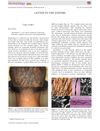 10 citations,
January 2010 in “International Journal of Trichology”
10 citations,
January 2010 in “International Journal of Trichology” Synthetic hair fibers for hair restoration were controversial in 2009 due to health risks and lack of support from the International Society of Hair Restoration.
 10 citations,
June 1998 in “International Journal of Dermatology”
10 citations,
June 1998 in “International Journal of Dermatology” Inflammation around hair follicles leads to hair loss, and treatments should focus on reducing this inflammation and other factors for effectiveness.
 January 2021 in “International journal of pharmaceutical research”
January 2021 in “International journal of pharmaceutical research” Sansevieria trifasciata P. extracts, especially the ethyl acetate fraction, effectively promote hair growth in male rabbits with hair loss.
May 2005 in “Hair transplant forum international” Trichotemnomania causes hair loss due to compulsive hair cutting or shaving.
 24 citations,
September 1985 in “Journal of The American Academy of Dermatology”
24 citations,
September 1985 in “Journal of The American Academy of Dermatology” The report suggests a possible link between hair loss and hidden scalp tumors but states more evidence is needed to confirm this.
3 citations,
January 1999 in “Hair transplant forum international” Hair transplant surgery can effectively treat hair loss in women.
 1 citations,
February 2018 in “Australasian journal of dermatology”
1 citations,
February 2018 in “Australasian journal of dermatology” Advanced imaging techniques are crucial for accurately diagnosing Monilethrix, a rare hair disorder.
 September 2023 in “Cureus”
September 2023 in “Cureus” Dr. SKS Hair Booster Serum effectively treats hair loss in women with PCOS.
 115 citations,
September 2000 in “The Lancet”
115 citations,
September 2000 in “The Lancet” Early hair loss may indicate risk of insulin resistance.
 112 citations,
July 2008 in “Dermatologic Therapy”
112 citations,
July 2008 in “Dermatologic Therapy” Folliculitis decalvans is a rare scalp condition causing scarring hair loss, treated with long-term antibiotics and other medications, but it often comes back and is hard to manage.
 29 citations,
January 2016 in “International Journal of Dermatology”
29 citations,
January 2016 in “International Journal of Dermatology” Longer hair loss leads to more severe CCCA; early treatment and avoiding damaging hairstyles help regrowth.
 14 citations,
January 2012 in “International Journal of Trichology”
14 citations,
January 2012 in “International Journal of Trichology” Hodgkin's lymphoma can show up as hair loss.
 11 citations,
January 2013 in “Indian Dermatology Online Journal”
11 citations,
January 2013 in “Indian Dermatology Online Journal” CCCA is a common, progressive hair loss condition that may not always be linked to hair care practices and requires a biopsy for diagnosis.
 9 citations,
January 2015 in “Current problems in dermatology”
9 citations,
January 2015 in “Current problems in dermatology” New hair transplant method allows for hair regrowth in the donor area and less scarring.
 4 citations,
January 2011 in “Journal of UOEH”
4 citations,
January 2011 in “Journal of UOEH” Autoimmune hair loss may be linked to increased Th1 and Th17 cells and decreased Th2 cells.
 November 2023 in “Advanced functional materials”
November 2023 in “Advanced functional materials” Magnesium Silicate Sprays help heal burn wounds and regrow skin features better than commercial products.
 July 2022 in “Plastic surgery and modern techniques”
July 2022 in “Plastic surgery and modern techniques” Using stem cell-enriched fat injections before hair transplant surgery can result in less hair loss and thicker hair.
September 2015 in “International Society of Hair Restoration Surgery” Hair follicle stem cells could lead to new hair loss treatments.
May 2001 in “Hair transplant forum international” The CapilliCARE® machine shows promise for diagnosing early hair loss.
 170 citations,
December 2009 in “Histopathology”
170 citations,
December 2009 in “Histopathology” The conclusion is that accurate diagnosis of different types of hair loss requires good teamwork between skin doctors and lab experts.
 165 citations,
December 2002 in “Molecular and Cellular Endocrinology”
165 citations,
December 2002 in “Molecular and Cellular Endocrinology” Male hormones, particularly DHT, are linked to male pattern hair loss, and treatments like finasteride can help, but they don't work for postmenopausal women's hair loss, which may have different causes.
 159 citations,
July 2006 in “Endocrine Reviews”
159 citations,
July 2006 in “Endocrine Reviews” Estrogens significantly influence hair growth by interacting with receptors in hair follicles and may help regulate the hair growth cycle.
 148 citations,
December 2018 in “Journal of autoimmunity”
148 citations,
December 2018 in “Journal of autoimmunity” Alopecia areata is an autoimmune disease causing patchy hair loss, often with other autoimmune disorders, but its exact causes are unknown.
 144 citations,
July 2002 in “Clinical and Experimental Dermatology”
144 citations,
July 2002 in “Clinical and Experimental Dermatology” Telogen effluvium is a common type of hair loss that can resolve on its own or become chronic, with treatment depending on early diagnosis.
 122 citations,
April 1995 in “Journal of Cutaneous Pathology”
122 citations,
April 1995 in “Journal of Cutaneous Pathology” The document describes how to tell different types of non-scarring hair loss apart by looking at hair and scalp tissue under a microscope.
 90 citations,
July 2008 in “Dermatologic therapy”
90 citations,
July 2008 in “Dermatologic therapy” Lichen planopilaris is a chronic, scarring hair loss condition with no definitive cure, requiring accurate diagnosis and treatment to manage symptoms.
 90 citations,
June 2006 in “The American Journal of Dermatopathology”
90 citations,
June 2006 in “The American Journal of Dermatopathology” The document concludes that accurate diagnosis of different types of hair loss requires careful examination of hair and scalp tissue, considering both clinical and microscopic features.
 72 citations,
July 2008 in “Dermatologic Therapy”
72 citations,
July 2008 in “Dermatologic Therapy” CCCA is a scarring hair loss condition mainly in African descent women, possibly caused by genetics and hairstyling, treated with gentle hair care and medications.
 70 citations,
June 2010 in “Clinics in Dermatology”
70 citations,
June 2010 in “Clinics in Dermatology” Certain groups may need vitamin supplements to improve hair health and prevent other health problems.
 68 citations,
May 2012 in “Annals of Oncology”
68 citations,
May 2012 in “Annals of Oncology” Some breast cancer chemotherapy can cause permanent hair loss.


























